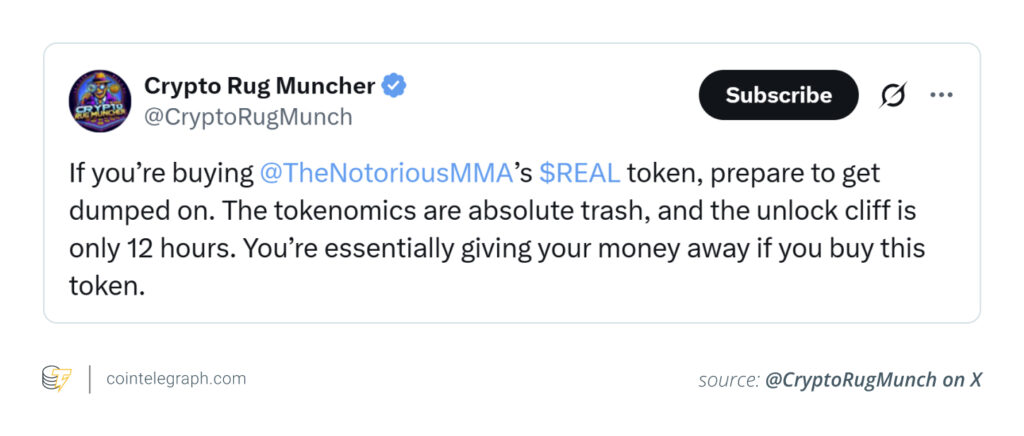In an intriguing twist in the cryptocurrency landscape, legendary mixed martial artist Conor McGregor has made his foray into the digital token realm with the launch of a new memecoin named REAL. The token, designed to facilitate staking and governance among its holders, was introduced in April 2025 amid a beset environment for crypto investments. McGregor, who famously parlayed his UFC fame into entrepreneurial ventures, launched this digital currency with the intention of offering something fresh in a market often riddled with skepticism towards celebrity endorsements.
“Ladies and gentlemen, this is REAL!” – Conor McGregor
However, the launch faced significant hurdles. McGregor’s fantasy of revolutionizing the memecoin space suffered a setback during its presale, where the Real World Gaming (RWG) decentralized organization aimed to raise at least $1,008,000 but only managed to collect a mere $392,315. This disappointing outcome prompted RWG to announce full refunds for all participants, a decision that McGregor himself endorsed.
This fundraising failure can be attributed to a combination of factors, including poor market timing, as the launch occurred amidst a downturn in major cryptocurrencies and rising investor cautiousness due to unsettling economic conditions. Additionally, widespread distrust towards memecoins—fueled by numerous scams and failed projects—also played a significant role in deterring potential backers. The misunderstanding of the REAL token’s objectives, coupled with McGregor’s controversial public image, further complicated its reception in a market already wary of celebrity-backed investments.
REAL was initially conceived to merge entertainment and crypto, featuring a unique model where token holders can stake their coins for rewards and participate in governance decisions within the ecosystem. Yet, the project’s tokenomics have faced scrutiny, particularly regarding its perceived lack of substance and clarity. Critics noted that the initial structure appeared to allow for quick sell-offs, which may have contributed to investor trepidation.
As McGregor and the RWG team regroup to rethink their strategy for a relaunch, the fate of REAL serves as a cautionary tale for both investors and promoters in the cryptocurrency space. It highlights the broader issues surrounding celebrity participation in crypto projects, where hype often overshadows genuine investment potential. This situation suggests that for any project—in particular those spearheaded by well-known figures—gaining lasting trust and viability requires more than just star power; it demands innovation, transparency, and a compelling vision for the future.
What Is REAL? Conor McGregor’s Staking-Enabled Memecoin Explained
The launch of Conor McGregor’s REAL memecoin aims to revolutionize the crypto landscape but faced significant challenges during its fundraising phase. Here are some key points that impact investors and the perception of celebrity-backed tokens:
- Celebrity Influence:
McGregor’s fame brought initial hype but ultimately did not guarantee investor trust.
- Fundraising Details:
The auction raised only 39% of the target amount ($1,008,000), leading to a complete refund for contributors.
- Market Conditions:
The fundraising coincided with a significant downturn in the cryptocurrency market, impacting investor sentiment.
- Scams and Trust Issues:
Previous memecoin scams lowered investor confidence, contributing to the skepticism toward REAL.
- Tokenomics Concerns:
The model faced criticism for allowing quick sell-offs post-acquisition, deterring potential long-term investors.
- Misinterpretation of Purpose:
Many viewed REAL merely as a celebrity-endorsed token without considering its proposed utilities.
- Regulatory Scrutiny:
The failed launch emphasizes the growing scrutiny celebrities face regarding crypto endorsements and potential legal consequences.
- Learning Points for Investors:
Investors should emphasize fundamentals over hype, conduct thorough research, and be cautious of the celebrity involvement in crypto projects.
“Relying solely on celebrity influence without understanding the fundamentals of a project can lead to poor investment decisions.”
The Struggle of REAL: A Deep Dive into Conor McGregor’s Memecoin Venture
The launch of Conor McGregor’s memecoin, REAL, aimed to shake up the cryptocurrency landscape but faced unfortunate hurdles that paid testament to the complexities of celebrity-backed projects. Compared to other celebrity-endorsed tokens, like Floyd Mayweather’s “Mayweather Token” and Elon Musk’s “Doge”, REAL’s debut highlights notable competitive advantages and disadvantages in attracting investors.
Competitive Advantages: McGregor is a global icon in mixed martial arts, giving him natural visibility and a pre-existing fanbase that could have offered a solid foundation for the token’s success. His brand’s appeal, particularly among MMA and sports enthusiasts, provided an audience primed for crypto discussions. The project’s attempt to leverage innovative fundraising techniques, such as a sealed-bid auction, was another noteworthy strategy aimed at creating fairness and transparency. By actively involving the community through potential staking rewards and governance rights, REAL sought to establish a participatory ecosystem unique among its peers.
Competitive Disadvantages: Unfortunately, the excitement surrounding REAL was severely undermined by several market and perception-related issues. Its launch coincided with a downturn in the crypto market, which adversely affected investor appetite for new memecoins. Unlike tokens such as Dogecoin, which benefitted from an established community and tangible market impact, REAL struggled with skepticism, especially in a landscape saturated with scams and rug pulls. This heightened distrust, fueled by broader economic uncertainty and a wary investor base, created significant headwinds for the fundraiser.
Furthermore, the project’s unclear purpose and vague tokenomics raised red flags for potential investors. Critics highlighted how the allocation model, including a controversial 12-hour unlock window for investors, resembled strategies often used in pump-and-dump schemes. Such concerns eroded confidence in REAL’s long-term viability, setting it apart from other celebrity tokens that maintained clearer value propositions or community engagement strategies.
As for who could profit or potentially suffer from this venture, true fans of McGregor might benefit from engaging with a project that aims to intersect sports and decentralized finance. However, more cautious investors looking for genuine projects could experience setbacks, as well as a broader investor community affected by the perceived negative implications of celebrity endorsements in crypto. Should REAL re-emerge with a stronger strategy and clearer utility, it could inspire both loyal fans and skeptics alike to reconsider the value of memecoins in the crypto landscape.

















